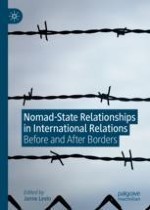2020 | OriginalPaper | Buchkapitel
13. International Relations and Migration: Mobility as Norm Rather Than Exception
verfasst von : Kiran Banerjee, Craig Damian Smith
Erschienen in: Nomad-State Relationships in International Relations
Aktivieren Sie unsere intelligente Suche, um passende Fachinhalte oder Patente zu finden.
Wählen Sie Textabschnitte aus um mit Künstlicher Intelligenz passenden Patente zu finden. powered by
Markieren Sie Textabschnitte, um KI-gestützt weitere passende Inhalte zu finden. powered by
